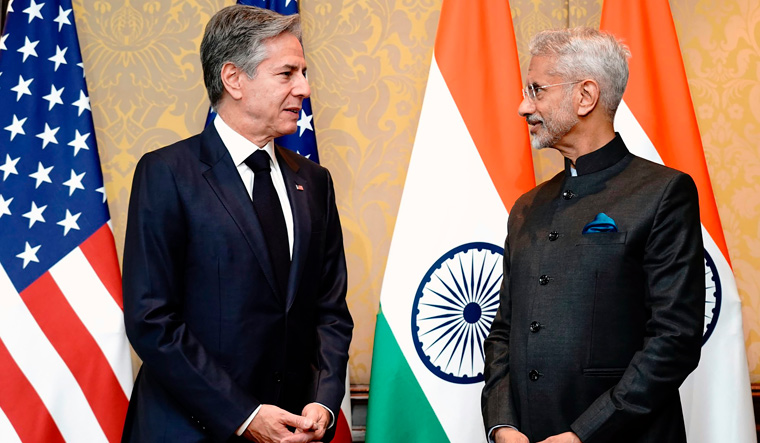During the ‘2+2’ dialogue between India and United States on Friday, serious concerns over increasing activities of pro-Khalistani elements in Canada was conveyed by India.
“We have made our concerns very very clear,” said Foreign Secretary Vinay Kwatra at a media briefing.
The ‘2+2’ foreign and defence ministerial meeting was led by Secretary of State Antony Blinken and Defence Secretary Lloyd Austin from the US's side, while External Affairs Minister S. Jaishankar and Defence Minister Rajnath Singh headed the Indian side.
"We have core security concerns and I am sure you are all aware of recent video that has surfaced from one such individual," Kwatra said. Kwatra also added that the US understood India’s concerns.
India-Canada tensions began after Prime Minister Justin Trudeau alleged India’s role behind the killing of Khalistani separatist Hardeep Singh Nijjar in June.
After Trudeau’s allegation, India had temporarily suspended issuance of visas to Canadian citizens and asked Ottawa to reduce its diplomatic presence in the country.
Canada has already withdrawn 41 diplomats and their family members from India.
In a separate media briefing, Blinken urged India to cooperate with the investigation by Canada into the Nijjar killing. "We think it is very important that India works with Canada on its investigation, and that they find a way to resolve this difference in a cooperative way," Blinken said.
"But that really does go with Canada moving its investigation forward and India working with Canada on it. And that's something that I've discussed with our Indian counterparts, including today," he said at a media briefing here.
Blinken also pointed out that both India and Canada are two of US's closest friends and partners.
India-US dialogue
Other areas of focus during the dialogue included expansion of global strategic partnership by shoring up engagement in areas of defence production, technology as well. Also talks were held on the current situation arising out of the Israel-Hamas conflict and China's military muscle-flexing in the Indo-Pacific.
The dialogue took place amid growing geopolitical turmoil triggered by the Russia-Ukraine war, Israel-Palestine conflict and growing tension in the Arab world.
EAM described the talks as "substantive". "Our agenda covered advancing our strategic partnership, including elevating our defense ties, moving forward in space & tech, future logistics cooperation and people to people contacts," he said on X (formerly Twitter).
"Also exchanged perspectives on the Indo-Pacific, South Asia, West Asia and Ukraine conflict. Reaffirmed our commitment to our collaboration in multilateral arena and engaging the Global South," he said.
Blinken said the US and India have a robust partnership and both sides are deliberating on matters with implications for the future.
"We are bolstering the partnership in international peace, security and specifically working to promote rules-based order, and uphold principles of sovereignty, territorial integrity and independence. Our defence cooperation is a key pillar of that work," he said.
"We are promoting a free and open, prosperous, secure and resilient Indo-Pacific, including by strengthening our partnership through the Quad with Japan and Australia," Blinken said.
Jaishankar stressed that the ties between India and the US are making significant progress.
"Our meeting takes place even as we make rapid strides in all aspects of our bilateral agenda. Our trade is today in excess of USD 200 billion, FDI is rising in both directions," he said.
Meawhile, Austin said India and US will co-produce infantry combat vehicles as part of defence industrial cooperation. A joint statement on '2+2' dialogue said India and US are setting up new liaison positions to facilitate seamless communication and cooperation between their armed forces.
India, US stand with Israel against terrorism
Amid intensifying Israel-Hamas conflict, the India-US joint statement after the dialogue called for an immediate release of all the remaining hostages.
Both the countries reiterated their support to Israel and further called for adherence to international humanitarian law.
"They also expressed support for humanitarian pauses and committed to continue close diplomatic coordination, including with key partners in the region, to prevent the conflict from spreading, preserve stability in the Middle East, and work toward a political solution and durable peace," the joint statement read.
The Ministers also called for concerted action against all terrorists, including through designations of individuals affiliated with groups that are listed by the UN Security Council 1267 Sanctions Committee, such as Al-Qaida, ISIS/Daesh, Lashkar-e-Tayyiba, and Jaish-e-Mohammed, it added.
The Ministers also decided to convene the 20th meeting of the India-US Joint Working Group on Counter Terrorism and the 5th Designations Dialogue next year.
(With PTI inputs)


